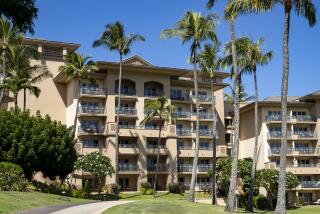Mumbai hotels put on brave face for openings
MUMBAI, INDIA — All approaches to the stately Taj Mahal hotel remain blocked by police checkpoints, and the smell of its charred woodwork continues to waft in the heavy air of Mumbai’s crowded waterfront.
But the doors of this Victorian symbol of last month’s terrorist attacks will reopen tonight, along with the similarly targeted Oberoi hotel across town, in the highest-profile attempt yet by this scarred city to return to normality.
Like other efforts here to deal with the fallout of the Nov. 26 assault that left about 170 people dead, including 63 of the hotels’ staff members and guests, the reopening will be done only haltingly.
The grand, red-domed palace that forms the heart of the Taj remains too damaged to accept guests, and only the prosaic, 1970s-era Taj Tower will be open to the public.
Similarly, of the two hotels in the Oberoi complex, only the Oberoi Trident has been sufficiently repaired; its sister hotel next door still has a gaping hole where its restaurant once overlooked the Arabian Sea.
But those who run the hotels insist that even a symbolic reopening, complete with a prayer service at the Oberoi and a party studded with Bollywood stars at the Taj, is essential to persuading international businesses and travelers to return to India’s financial capital.
“The time has come to look forward into the future,” Rattan Keswani, president of Trident Hotels, said at a news conference Saturday. “I seek help from all of you to address your efforts to portraying Mumbai and India as a safe destination.”
That could be a difficult task. Hotel executives report that nearly 35% of all room reservations have been canceled across the country, and an already weak year for Indian tourism has seen a sharp drop-off in December.
More troubling for this hub of India’s economic boom, however, are anecdotal reports from Indian business leaders that their foreign counterparts have begun to cancel conferences and reevaluate the risks of doing business here.
“I think the confidence level amongst businesses within India actually was not destroyed as a result of these attacks. The Bombay stock market was closed for one day, but the day immediately after . . . it actually went up slightly,” said Jamshyd N. Godrej, a prominent Mumbai-based manufacturing executive and former head of the Confederation of Indian Industry. “I think the confidence that has really evaporated has been in the foreign business community.”
The sour prospects seem to have infected the sense of national unity that pervaded in the days following the attack, which has begun to crumble amid an unexpected wave of recriminations over how an attack could have succeeded in such prominent locations.
Last week, Ratan Tata, the charismatic chairman of the group that owns the Taj chain, went on TV to say his company would employ its own security guards because he no longer had confidence in Mumbai law enforcement. The next day, a top state minister fired back, saying the Taj and the Oberoi had been warned of possible terrorist threats just weeks before the assault.
For this weekend, however, Oberoi and Taj executives have tried to rally the country again, regaling the public with tales of heroism by their employees.
R.K. Krishna Kumar, who overseas the Taj hotel group for Tata, said all of the hotel’s employees have vowed to return to work, even those who lost family members in the attack.
“The attack on Taj Mumbai or the Oberoi are not unique instances in the history of the last 10 years,” Kumar told a small group of foreign journalists, citing bombings on other prominent buildings, including the World Trade Center. “New York bounced back. I expect the same situation in India for all hotels and for us. Perhaps more for us.”
In the lobby of the Trident, nearly all signs of the attacks have been wiped away. The giant glass window panes shot out by Kalashnikov-wielding men have been replaced, restoring the sweeping water views. Bullet marks on the marble floors and wooden columns have been filled in.
But there is also a rifle-bearing policeman at the entrance in a bunker made of concrete-filled bags, and executives at both hotels plan to add metal detectors and baggage scanners at their entrances. The hotels also plan on discreetly arming plainclothes guards who will patrol inside.
“We’ll try to keep it as unobtrusive as possible,” Trident’s Keswani said of the increased firepower. “It’s not the most elegant thing.”
The remaining Taj and Oberoi facilities aren’t expected to reopen for months. Keswani estimated that the total cost of rebuilding the Oberoi could top $10 million. The damage to the Taj is so extensive that executives have yet to estimate repair costs; the fifth and sixth floors of the building’s south wing were gutted by fire and may not be ready for guests for more than a year.
Even with the hurdles, hotel staff at the Trident, dressed again in starched whites or gold saris, insisted that they were excited to be back at work and were looking forward to the return of guests. But it is clear the attacks are still at the forefront of their minds.
“My family had concerns, but now they say I should go back to work,” said Kalpesh Fapale, who works at the coffee bar in the Trident’s lobby. “This hotel is a family.”
--
More to Read
Sign up for The Wild
We’ll help you find the best places to hike, bike and run, as well as the perfect silent spots for meditation and yoga.
You may occasionally receive promotional content from the Los Angeles Times.






